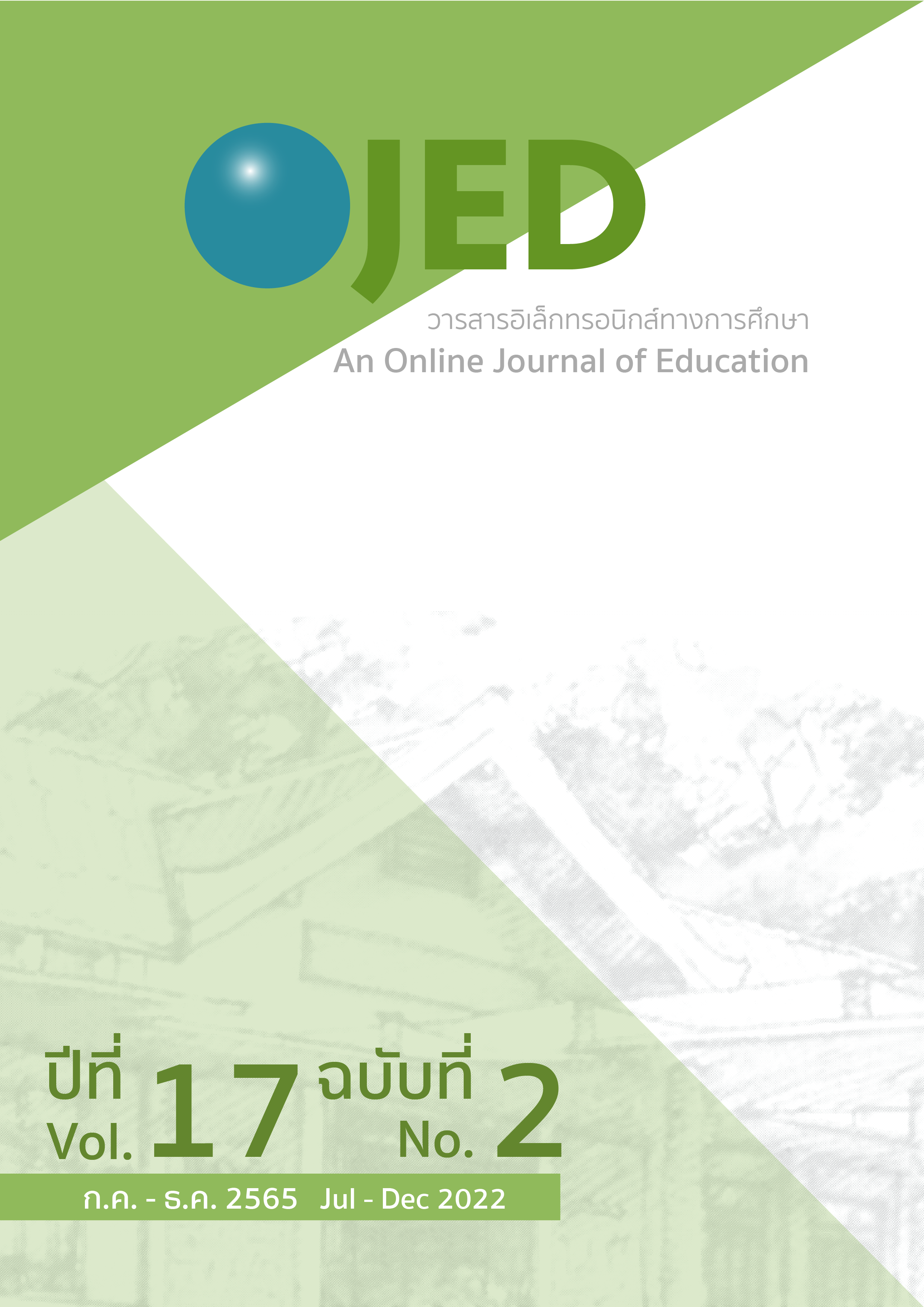Effects of Learning Management Using R-C-A Question Technique on Achievement and Applicative Thinking of Lower Secondary School Students
DOI:
https://doi.org/10.14456/ojed.2022.61Keywords:
Learning in Physical Education Management, R-C-A Question Technique, learning achievements, applicative thinkingAbstract
The purposes of this research were 1) to compare the pre-test and post-test learning achievement and applicative thinking skills scores of an experimental group who participated in a physical education program using the Root Cause Analysis (RCA) question technique, and 2) to compare the learning achievement and applicative thinking skills of the experimental group with a control group. Thirty 9 grade students, who were divided into two groups of 15 students, participated in this study. The control group participated in a traditional physical education program, while the experimental group participated in an applied physical education program using an 8 lesson RCA question technique. The index of item-objective congruence of learning achievement, which was comprised of knowledge, morals, attitude, sport skills, physical fitness, and applicative thinking skills. was 1.00. During the program, the participants were required to participate for 50 minutes per lesson, 1 day per week for 8 weeks. After the program, the data were analyzed using mean, standard deviation, and t-test. The findings were as follows: 1) In the experimental group. the mean post-test scores of the learning achievement and applicative thinking skills were significantly higher than those of the pre-test scores at the .05 level of significance; however, no statistical differences were found in the control group. 2) The mean scores of learning achievement and applicative thinking skills of the experimental group were significantly higher than those of the control group at the .05 level of significance.
References
ภาษาไทย
กระทรวงศึกษาธิการ. (2551). หลักสูตรแกนกลาง การศึกษาขั้นพื้นฐาน พุทธศักราช 2551.
กรุงเทพมหานคร: โรงพิมพ์องค์การรับส่งสินค้าและพัสดุภัณฑ์.
เกรียงศักดิ์ เจริญวงศ์ศักดิ์. (2546). การคิดเชิงประยุกต์. กรุงเทพฯ: ซัคเซสมีเดีย.
กุลธิดา เหมาเพชร. (2553). การพัฒนารูปแบบการเรียนการสอนโดยใช้ทฤษฎีพหุปัญญาเป็นฐานเพื่อพัฒนา
ผลสัมฤทธิ์ทางการเรียนพลศึกษาของนักเรียนระดับประถมศึกษา.
(วิทยานิพนธ์ครุ ศาสตร์มหาบัณฑิต). ภาควิชาหลักสูตร การสอนและเทคโนโลยีการศึกษา,
สาขาวิชาพศึกษา, จุฬาลงกรณ์มหาวิทยาลัย.
กิตติชัย สุธาสิโนบล. (2541). ผลการใช้เทคนิคการตั้งคำถามของครูที่มีต่อผลสัมฤทธิ์ทางการเรียน
วิทยาศาสตร์ทักษะกระบวนการทางวิทยาศาสตร์และพฤติกรรมกลุ่มของนักเรียนชั้น
ประถมศึกษาปีที่ 5. วิทยานิพนธ์ปริญญามหาบัณฑิต, สาขาวิชาการประถมศึกษา
คณะศึกษาศาสตร์มหาวิทยาลัยศรีนครินทรวิโรฒ.
กัญญา วีรยวรรธน. (2556). [ออนไลน์]. “เทคนิคการตั้งคำถาม.” [สืบค้นเมื่อ 20 ตุลาคม 2558].
จาก http://www1.nsdv.go.th/innovation/questioning.htm.
จิราพร อัครสมพงศ์. (2556). [ออนไลน์]. “การตั้งคำถาม.” [สืบค้นเมื่อ 20 ตุลาคม 2558].
จาก http://sornorjira.wordpress.com/2013/04/24.
จิรกรณ์ ศิริประเสริฐ. (2543). ทักษะและเทคนิคการสอนพลศึกษาในระดับประถมศึกษา. กรุงเทพฯ:
สำนักพิมพ์แห่งจุฬาลงกรณ์มหาวิทยาลัย.
ชาตรี สำราญ. (2544). ครูรู้ได้อย่างไรว่าเด็กเกิดการเรียนรู้. พิมพ์ครั้งที่ 3. กรุงเทพฯ : มูลนิธิ
สดศรีสฤษดิ์วงศ์.
ทิศนา แขมมณี. (2545). ศาสตร์การสอน.กรงเทพมหานคร : สำนักพิมพ์แห่งจุฬาลงกรณ์
มหาวิทยาลัย.
สุกัญญา วงค์ชัย (2556). การวิเคราะห์ปัจจัยพหุปัจจัยระดับที่ส่งผลต่อความสามารถในการคิดเชิง
ประยุกต์ของนักเรียนชั้นมัธยมศึกษาปีที่ 2 สังกัดสำนักงานเขตพื้นที่การศึกษา
มัธยมศึกษาเขต 36 ในจังหวัดเชียงราย. (วิทยานิพนธ์ปริญญาครุศาสตร์มหาบัณฑิต
ไม่ได้ตีพิมพ์). มหาวิทยาลัยราชภัฏเชียงราย, เชียงราย.
วรศักดิ์ เพียรชอบ. (2527). หลักและวิธีสอนพลศึกษา. (พิมพ์ครั้งที่ 2). กรุงเทพมหานคร:
ไทยวัฒนาพานิชย์.
____________. (2548). รวมบทความเกี่ยวกับ ปรัชญา หลักการ วิธีสอนและการวัดเพื่อประเมินผลทาง
พลศึกษา. กรุงเทพฯ : สำนักพิมพ์แห่งจุฬาลงกรณ์มหาวิทยาลัย.
ว่าที่เรือตรียุตติชน บุญเพศ. (2557). [ออนไลน์]. “การศึกษาผลการจัดกิจกรรมการเรียนรู้โดย
ใช้เทคนิคคำถามแบบ R-C-A เพื่อพัฒนาทักษะชีวิตและเสริมสร้างภูมิคุ้มกันปัญหายา
เสพติดของนักเรียนชั้นประถมศึกษา ปีที่ 6 โรงเรียนบ้านหนองน้ำขุ่น.” [สืบค้นเมื่อ
ธันวาคม 2558]. จาก http://203.172.179.22/reis/?name=research&file= readresearch&id=35.
Etherington. (2560). ความหมายพลศึกษา. ออนไลน์ :
https://sites.google.com/site/adisakwizardmanu/prawatiswntaw?
tmpl=%2Fsystem%2Fapp%2Ftemplates%2Fprint%2F&showPrintDialog=1
ภาษาอังกฤษ
Hastie, P. A. (2006). Teaching elementary physical education: strategies for the
classroom teacher. U.S.A: Pearson Benjamin Cumming is a trademark of Pearson
Education.
Downloads
Published
How to Cite
Issue
Section
License
Copyright (c) 2022 An Online Journal of Education

This work is licensed under a Creative Commons Attribution-NonCommercial-NoDerivatives 4.0 International License.




